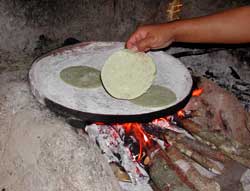 One in twenty American workers are in the US illegally. Adding wives, children and other family members, estimates for undocumented immigrants range between 9 and 11 million. More than half of those are Mexicans, and despite a trebling of spending on border security, the number of illegal border crossings continues to rise.
One in twenty American workers are in the US illegally. Adding wives, children and other family members, estimates for undocumented immigrants range between 9 and 11 million. More than half of those are Mexicans, and despite a trebling of spending on border security, the number of illegal border crossings continues to rise.
In this series of posts, I hope to put a human face on Mexican immigration, to examine the forces that drive Mexicans to America, and to consider American immigration policy in light of Christian ethical principles.
My primary question is this: Does America have a moral duty towards Mexico, and if so, what polices should we implement to balance internal security on the one hand with a humane response to Mexico’s economic challenges on the other?
‘For I was hungry, and you fed me. I was thirsty, and you gave me a drink. I was a stranger, and you invited me into your home. I was naked, and you gave me clothing. I was sick, and you cared for me. I was in prison, and you visited me.’
Then these righteous ones will reply, ‘Lord, when did we ever see you hungry?…’
And the King will tell them, ‘I assure you, when you did [these things] to one of the least of these my brothers and sisters, you were doing it to me.’ —Matthew 25:35-40, NLT (Jesus speaking)
The forces that are driving people out of Mexico and pulling them into the United States are still extremely strong and haven’t diminished in the last 10 years. If anything, they’ve intensified. —Wayne Cornelius, Center for Comparative Studies, UC San Diego
Alfonso† has lived his entire life in a small cluster of villages perched on a lush mountain range in rural Mexico. His ancestors once ruled this country, until Cortez dropped anchor in Veracruz and burned his ships, because he planned to stay.
Those were better days.
Alfonso’s mother tongue is not Spanish, but one of Mexico’s 291 indigenous languages. He rises before dawn every morning and heads out with his brothers, uncles and father to tend the corn and coffee that thrives on these slopes. While the men tend the fields, the women gather firewood and haul water up from the river in the valley below.
Alfonso’s home is built of rough-sawn planks and roofed with corrugated tin imprinted with soup-can labels, rejects from a canning company. His windows have no glass; chickens roam freely in and out of the open front door.
Maria, his mother, cooks over an open fire. Smoke escapes from cracks in the walls as she bakes tortillas on a clay platter. The chickens provide eggs. Black beans simmer in a pot. There is no meat.
Maria’s eyes have turned cloudy from a life spent standing over smoky fires. She is bent and bowlegged from carrying heavy loads, and from a diet low in fruits and vegetables. To an outsider, life here seems impossibly difficult. To Alfonso, this is just the way life has always been.
Except for one thing: coffee used to support his family, but no longer. Globalization has forced small farmers like Alfonso to compete with plantations in Vietnam, where government programs have made them the world’s second largest producer. Asian coffee has flooded the market, causing prices to plummet—good news for coffee lovers; bad news for growers.
 TransFair USA is a non-profit, Fair Trade organization that seeks to guarantee small farmers a minimum, fair price for their coffee. According to TransFair:
TransFair USA is a non-profit, Fair Trade organization that seeks to guarantee small farmers a minimum, fair price for their coffee. According to TransFair:
Coffee prices on the world market slid to an all-time low in 2002 of 45 cents per pound—well below the costs of production—and led to escalating unemployment, landlessness, and hunger among small-scale farmers…
To make matters worse, most small-scale farmers, who are not organized in marketing cooperatives, must sell to middlemen, capturing a mere 2% to 4% of the retail price of coffee.
They go on to report that the average $3 latte delivers less than 2 cents back to farmers like Alfonso, who don’t benefit from Fair Trade agreements.
Caught in a global vise, Alfonso looks north to a place where farm laborers earn more in a few weeks picking strawberries than coffee pays in a year.
But getting to America will cost him dearly. Besides food, clothing and a bus ticket to the border, a “coyote” will charge Alfonso $1,500 or more to smuggle him to safety. He’ll be deposited in the Arizona desert and told to walk north to a rendezvous point. What he won’t be told is that he may have to cover 100 miles, surviving heat by day and cold at night, all while dodging the Border Patrol. If he survives—hundreds die in the attempt every year—he may be robbed and abandoned by the very coyote who promised to help him.
And if he makes it?
He will be driven to a rough hut where he will live with other workers, none of whom will speak his language. He will try to live below the radar. If he gets hurt, he will treat himself. If his boss cheats him, he will not report it. He will surface only long enough to work, buy food and send money home to his family.
At night, he will be lonely. If he is married, his children may forget what he looks like. His marriage may suffer from the long separation. Because of the tighter border security, Alfonso will not leave again for a very long time. The risks and costs of going back and forth are simply too great.
Knowing all of these things, knowing the hardships and risks, what drives the Alfonsos of Mexico to keep coming to America?
That’s easy: There are jobs in America. There is hope in America. In many parts of Mexico, there is neither.
†
Mexican names and situations are fictional, but represent typical undocumented immigrants.
Sources: TransFair USA, Pew Hispanic Center, The Ethnologue, Urban Institute, The Arizona Republic, CIA World Factbook, NationMaster.


Good start, Charlie! You put me right on the “horns”… i.e., of da dilemma!!!
This looks pretty good. i like the direction you’re taking this. I’m glad to see a human face put to what most of us either see as pure statistics or a simple question of legalities.
Still, I’m not certain it’s necessarily a moral duty of America that needs addressing, but more, the moral duty of American believers. We are too easily dissuaded from caring, from helping.
Most certainly a valid and important viewpoint!
How far should it be taken though. One only has to live in the areas most congested with immigrants to see the affects/drain on education,
healthcare, prisons, etc.. Can we or have we reached a point when it is going to overwhelm the
capitalist lifestyle and create a same scenario as in their homeland?
I certainly do sympathize with Alfonso’s plight. Illegal immigrants will face many hardships and dangers just to cross the border. Once they arrive in the U.S., they may continue to live in the lower class just to avoid detection. Let’s face it, life does not become easy just because they are in the U.S. With all of this in mind, wouldn’t it make more sense to enter this country legally on a work visa and apply for citizenship? It seems to me that a legal citizen who speaks english has a much greater opportunity of becoming successful, than someone that has to live “off the grid”.
I recently found your site while looking up ebenezer and loved all I read. Immigration subject I have struggled with after living in Houston, TX. We finally decided it would be best for our family to relocate as we were not accepted in latino Houston. My kids were sadly shunned by their spanish speaking classmates. They considered Mexico rather than the US to be their homeland. They bragged about their free college offers without the effort my children devoted to their studies. We now prefer to sacrifice our vacation time doing medical missions in Guatemala . Entitlement and lack of gratitude is permiating our country. Something I check my own heart for daily.
Regarding the illegal alien from Mexico who strangled a San Marcos woman (NCT, 2/7). Sadly, this is another illustration of how insecure homeland security is. Yet, there are many twists and turns. Things I haven’t thought about. For example, sustaining the ultra rich appears to be a matter of national security. Here’s how it goes: Wealthy US corporations oppress, suppress or otherwise stabalize vocal poor in Guatemala, Honduras and El Salvador. Subsequently, the beaten and poor flee to Mexico where they hook up with equally poor Mexicans. Meanwhile, Mexico’s super rich print and distribute maps to the poor directing them to the United States. But not too many. The rich need their slave labor, too. What a great plan. The ruthless rich conquer the poor. The powerless poor flee and seek refuge in America’s middle class. Conequently, the middle class gets mad at the poor. It’s time to go to war again with Mexico. This country is more harsh and evil than the Middle East. Yet, they come at you with a big smile, offer you some tequila and a cabin on Cabo San Lucas. What manipulative people the Mexican government is. What greedy frauds the super ruthless rich are for not caring about the poor. All these big leaders and politicians are in for a rude awakening when Jesus comes.
Can u write something were the mexican immigrant ends up actually having a better life
I can appreciate the sympathy towards the people who come here to better their situations, but my sympathies are for Americans who were born here or immigrated legally. These are the people whose wages are being suppressed by illegal workers and H1B visa imports, if they have a job at all. Work of any kind is becoming increasingly difficult to find, and many of us are looking for employment – the same people who are still paying taxes to support the needs and wants of the illegal aliens.
We are beset with lies: The illegal alien is taking only jobs we don’t want. Not true! The illegal alien contributes to the economy. Not true. They cost us more than they contribute in taxes. They pay taxes. With whose stolen ID?
Who’s paying the price for this deception? –Americans who deserve better than the blatant lies of those who reach into our pockets to encourage people to come here ILLEGALLY.